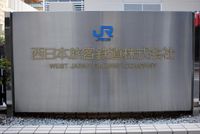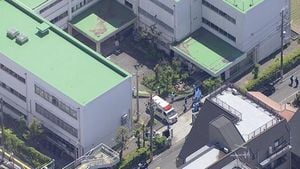On April 8, 2025, at approximately 4:40 PM, a rapid train on the JR Kobe Line, traveling between Motomachi and Kobe stations in Kobe City's Chuo Ward, was abruptly halted by its driver after smoke was spotted on the tracks. The quick action prevented what could have been a more serious incident.
According to JR West Japan, the source of the smoke was traced back to traces of burning grass located about 600 meters east of Kobe Station, specifically on the westbound track. This discovery not only led to the immediate cessation of train operations but also raised concerns about safety protocols along the busy rail line.
The impact of the smoke incident was significant, resulting in a suspension of train services between Ashiya and Nishi-Akashi for approximately 1 hour and 20 minutes. During this time, many commuters found themselves stranded or delayed, as the train schedule was severely disrupted.
On the same day, further complications arose when two separate incidents occurred involving the pressing of emergency stop buttons at railroad crossings along the Kobe Line. These incidents contributed to an already chaotic situation, compounding the delays and confusion for travelers.
Ultimately, the disruptions led to a total of 30 trains being canceled across both the up and down lines, while an additional 45 trains experienced delays of up to 99 minutes. In total, approximately 56,000 passengers were affected by the combined incidents, highlighting the ripple effect such events can have on public transport systems.
This incident serves as a reminder of the critical importance of safety measures in rail transport. Train operators, like JR West Japan, are tasked with the responsibility of ensuring that their services run smoothly and safely, a challenge that can become daunting in the face of unexpected events.
As railways remain a vital mode of transportation for many in Japan, the repercussions of such incidents extend beyond just the immediate disruptions. They can lead to a loss of trust in the efficiency and safety of the transport system. Passengers rely on timely and safe travel, and incidents like these can shake that confidence.
In response to the incident, JR West Japan is likely to review its safety protocols and emergency response strategies. Ensuring that train crews are adequately trained to handle emergencies and that communication systems are robust will be crucial for preventing similar occurrences in the future.
Moreover, the company will need to address the public's concerns regarding safety and reliability. Transparent communication about the causes of such disruptions, along with steps taken to mitigate future risks, will be essential in restoring public confidence.
As the events of April 8 unfolded, social media buzzed with comments from affected passengers. Many expressed their frustration over the delays, while others shared their relief that the situation was handled without any reported injuries. The quick response from the train driver, who acted promptly upon noticing the smoke, was praised as a key factor in averting a potential disaster.
JR West Japan's operations have experienced challenges in the past, but incidents like this one underline the need for continuous improvement in safety practices and emergency readiness. The company has a track record of maintaining a high standard of service, and it will be crucial for them to learn from this incident to uphold their reputation.
In the coming days, JR West Japan will likely release a detailed report outlining the incident's specifics, including the response measures taken and any changes to be implemented in their operational protocols. Passengers and the general public will be watching closely to see how the railway company addresses this situation and what steps they will take to prevent future occurrences.
This incident highlights not only the vulnerabilities within public transportation systems but also the resilience of those who operate them. The swift actions taken by the train crew and the subsequent response from JR West Japan demonstrate a commitment to safety and service, even in the face of unexpected challenges.
As the investigation continues, it will be essential for all stakeholders, including local authorities and transport safety experts, to collaborate and ensure that the lessons learned from this incident lead to enhanced safety measures for the future.
The public's trust in the rail system hinges on the ability of operators to manage crises effectively and transparently. As JR West Japan navigates the aftermath of this event, it will be an opportunity for reflection and growth in their operational practices.
In conclusion, while April 8 was a day marked by disruption for many commuters, it also serves as a pivotal moment for JR West Japan to reaffirm its commitment to safety and reliability in public transport.





